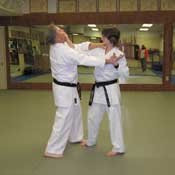Just before her junior year in college at Delta State University, around 1999, now the love of my life and bride, Lacey, met a young man while working at a summer job. He offered to show her around because she was new to the area and transferring from Hinds Community College.
They soon began dating, but the relationship started to unravel when the young man wanted to get serious. Lacey was not looking for a serious commitment. She ended it after a major fight when the young man got physical with her.
Shortly afterward, Lacey began to receive unwanted letters and phone calls from the man. Over time, they became threatening and frightening. Her ex-boyfriend was a parole officer so he knew just how to bend the law without breaking it. Lacey documented everything, though, and took it to Delta State Police Chief Lynn Buford, who contacted the young man's boss. The letters and calls finally stopped.
Many women deal with stalkers or have a need to defend themselves. Imagine walking across a dark lonely parking lot on your own. If you are a man, this might not bother you, but if you are a woman, this type of scenario can be scary. It becomes even more frightening if you know a man is following you.
Being a son, a brother and a husband, I worry about the safety of the women in my life. That led me to look at the statistics on assaults against women. Here's what I learned: Even being at home or a familiar place can be dangerous for women. People known to their victims commit two-thirds of all sexual assaults, the U. S. Department of Justice's 2005 National Crime Victimization Study reports.
One in six women will be a victim of sexual assault at some point in her life, according to a report from the National Institute of Justice and the Centers for Disease Control and Prevention, But, according to Coalition Educating About Sexual Endangerment, the actual number is twice as high due to under-reporting: One in three American women will be a victim of sexual assault in their lifetime.
FBI crime statics for 2009 show 939 forcible rapes in Mississippi. The majority of those assaults were in metropolitan areas.
Next stop: Find out if anyone teaches women's self-defense classes in the Jackson area. Millsaps College offers a course on women's self-defense as a satellite program at Chatan Dojo USA School of Karate in Richland. The school welcomes walk-ins, too.
Sensei (teacher) Shelby Kenney, a surprisingly solid and powerful man even at about 5-foot-9, is a retired Air Force major. While stationed in Okinawa, Japan, he began to study Shohei-Ryu martial arts and today is a sixth-degree black belt with 24 years of training.
Kenney has taught Shohei-Ryu for 20 years. While he was in the Air Force, several female lieutenants asked him to offer a
women's self-defense class. He crafted a course using common Shohei-Ryu training in practical situations.
Shohei-Ryu is a hard-soft style of martial arts—hard because body conditioning teaches students to take and deliver a full-force attack. Shohei-Ryu is a soft style because it teaches how to deflect an attack as well. Kenney asked me to punch him full force. It was like punching a brick wall. I have never seen stomach muscles that hard. I can attest his style does teach how to take a full-force punch.
One of the first things Kenney teaches is how just being vigilant can help prevent someone from becoming a victim. You can discourage potential predators by parking in well-lit areas, for example, or having your keys out and eyes up when heading to your car.
Kenney stresses that he hopes his students will never need to use Shohei-Ryu. "But with proper training, you can have a 20- to 30-second advantage," he says. It's an advantage that could save you.
The training teaches practitioners how to stun an attacker and get away, and includes knowing how to go for pressure points such as the groin, and attacks to soft parts of the body such as the eyes. Using these techniques, a woman can gain the upper hand on her attacker and get control of the situation. Kenney teaches how a woman can protect herself if her attacker comes from the front, back, or even if women end up on the ground, being attacked in a reclined position.
Joining Kenney as assistant teachers at the Chatan Dojo are Erin Cox, a second-degree black belt, and Emily Luckett, a junior black belt. These young women demonstrate techniques and simulate attacking students so they can learn how to defend themselves.
Women take this class to learn self-defense, improve self-confidence or deal with fear, Kenney says. Several women retake the class after completing it to keep their skills fresh.
The Chatan Dojo USA is at 657 U.S. Highway 49, in the Richland Village Shopping Center. The cost of a six-class series is $110 and provides nine hours of training. To learn more, call Kenney at 601-420-0009, or visit http://www.chatandojousa.com.



Comments
Use the comment form below to begin a discussion about this content.
comments powered by Disqus